26 Jul2019
By Katrina Norfleet
The Teacher Educator national peer-reviewed journal recently shared the top 10 most downloaded articles in the first three months of 2019. The most downloaded article in 2018 was “Current Issues in Teacher Education: An Interview with Dr. Linda Darling-Hammond” with 2,726 downloads. Other popular articles cover a range of topics including multicultural teacher education, perceptions of ELL students, student stress and coping, and teaching reflective practice. The full list of the top 10 articles are included in the table below.
AACTE President and CEO Lynn M. Gangone serves on Editorial Advisory Board of The Teacher Educator, a forum for promoting discussion among educators who seek to challenge existing boundaries in the field. The journal invites AACTE members to submit notable work on current
24 Jul2019
By Tommy Navickas
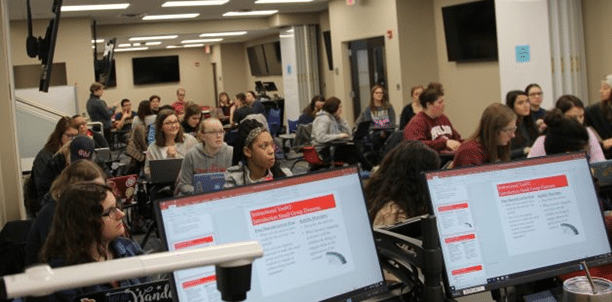
This article and photo originally appeared in Illinois State University News and are reprinted with permission.
For several years, the College of Education has prioritized the redesign of classrooms and computer labs to reflect the flexible learning needs of aspiring educators and their future students.
The first reimagined collaborative space was Studio Teach. The third-floor, approximately 2,000-square-foot area overlooks the University’s Quad. It features dozens of flexible seating options, stations where multiple students can connect to a single monitor, SMART Boards, a 3D printer, an educational gaming area, a writeable white board partition, multiple wall-mounted monitors, and an array of technology available for checkout.
Storage areas on DeGarmo’s garden level have also been converted to classroom spaces with several interactive monitors that can be controlled individually or together through a single source. In addition, several classroom spaces in DeGarmo have been remodeled with a few more to come this fall. They too incorporate flexible seating and cutting-edge educational technologies.
The Richard L. Benson Flexible Learning Space was created with the help of funding by the alumnus for which it was named.
It’s a shift in mindset reflective of the evolving state of PreK–12 learning environments across
19 Jul2019
By Brian McNeill
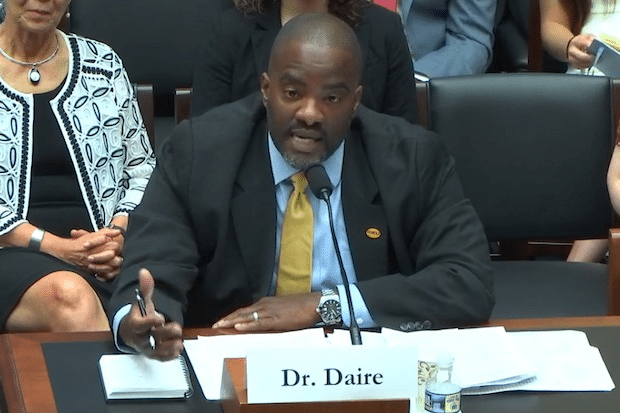
This article and photo originally appeared in VCU News and are reprinted with permission
Andrew Daire, dean of the School of Education at Virginia Commonwealth University, testified at the U.S. House Wednesday about how VCU is working to prepare high-quality, dedicated classroom teachers and encouraged Congress to support similar initiatives across the country.
“Immediate and innovative action is required to address the challenges in high-needs and low-performing schools with families living in generational poverty and disparities in student learning outcomes,” said Daire, testifying before a joint U.S. House Education and Labor Committee subcommittee hearing on “Educating our Educators: How Federal Policy Can Better Support Teachers and School Leaders.”
“The challenges faced by many of our schoolchildren, and in many of our schools, are not average and will not be met with average efforts,” Daire said in his prepared testimony. “We need to be bold and aspirational in our desires and efforts to address these challenges.”
19 Jul2019
By Michael Rouleau
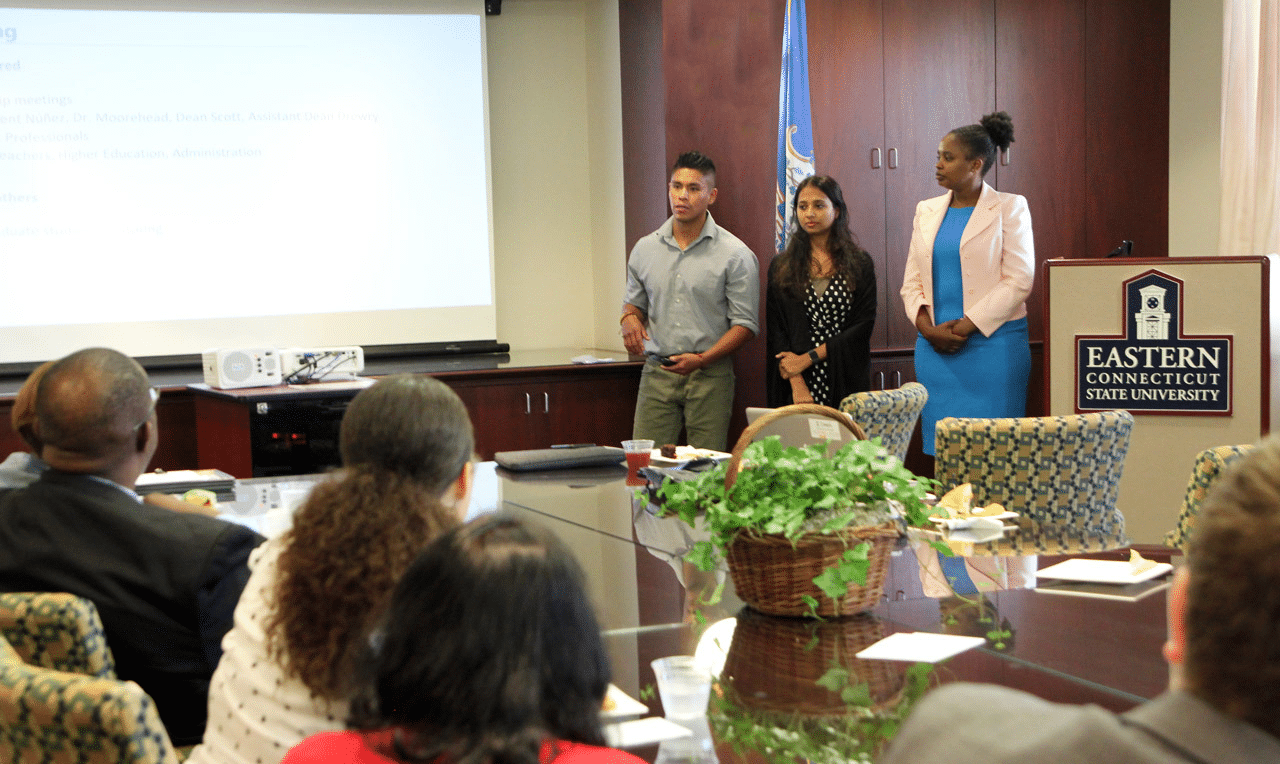
This article and photo originally appeared on the Eastern Connecticut State University website and are reprinted with permission.
School districts across the nation continue to face a lack of minority teachers. Eastern Connecticut State University’s participation in the Holmes Master’s Program seeks to alleviate this problem. On June 28, Eastern celebrated three aspiring teachers from underrepresented backgrounds who will soon enter the teaching profession. Faith Kioko (Ashford), Ian Stygar (Lebanon) and Sayantani Nandy (Ellington) were honored at the annual Holmes Master’s Luncheon, hosted by the School of Education & Professional Studies and Graduate Division.
The American Association of Colleges for Teacher Education’s (AACTE) Holmes Program supports students from historically underrepresented groups who are pursuing careers in education. Eastern continued its partnership with Holmes, hosting its third cohort of Master’s students this year.
The 2019 cohort of full-time graduate students had a busy year in pursuit of teacher certification. In addition, they designed research proposals, worked in Eastern’s Center for Early Childhood Education, presented to classes and hosted forums on campus. They interviewed alumni teachers and gathered data for the Council for the Accreditation of Educator Preparation (CAEP). They also attended the AACTE’s annual Washington Week and advocated on
17 Jul2019
By Jerrica Thurman and Donna Sacco
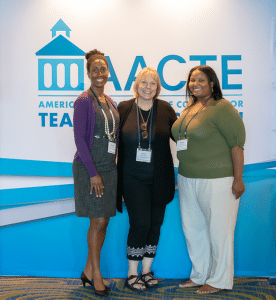 AACTE’s Jerrica Thurman first met Donna Sacco in 2015. Sacco was one of three doctoral students from George Mason University (GMU) who worked as an AACTE education intern, assisting in advocating for high-quality preparation programs and with its marketing communications. Thurman was pleasantly surprised when she saw Sacco at AACTE’s 2019 Washington Week with her two Holmes doctoral students from the University of North Carolina at Charlotte (UNCC). It was during her AACTE internship that Sacco learned about the Holmes Program and determined to make a personal contribution to help diversify the teacher workforce by becoming a Holmes advocate. The following summary highlights an interview Thurman had with Sacco about her journey from an intern to a change agent in education.
AACTE’s Jerrica Thurman first met Donna Sacco in 2015. Sacco was one of three doctoral students from George Mason University (GMU) who worked as an AACTE education intern, assisting in advocating for high-quality preparation programs and with its marketing communications. Thurman was pleasantly surprised when she saw Sacco at AACTE’s 2019 Washington Week with her two Holmes doctoral students from the University of North Carolina at Charlotte (UNCC). It was during her AACTE internship that Sacco learned about the Holmes Program and determined to make a personal contribution to help diversify the teacher workforce by becoming a Holmes advocate. The following summary highlights an interview Thurman had with Sacco about her journey from an intern to a change agent in education.
What piqued your interest in the issues of teacher diversity as a doctoral student at George Mason University and student intern at AACTE?
Before my doctoral program, I was a special educator with a master’s degree in bilingual special education. For my entire career, my focus has been on culturally and linguistically responsive instructional practices. Part of my drive came from the stories my father told me about the obstacles he experienced in his childhood as the son of Italian immigrants. He was a brilliant man but never went to college. He had one advocate who helped mentor him in appreciating the arts but had no teachers who were advocates, role models, or who understood his background. Once I began researching teacher education, I was surprised to learn that the teaching force is composed of roughly 80% white female teachers. How had I missed that obvious point? I am a white female who was teaching mostly boys of
17 Jul2019
By Linda Minor
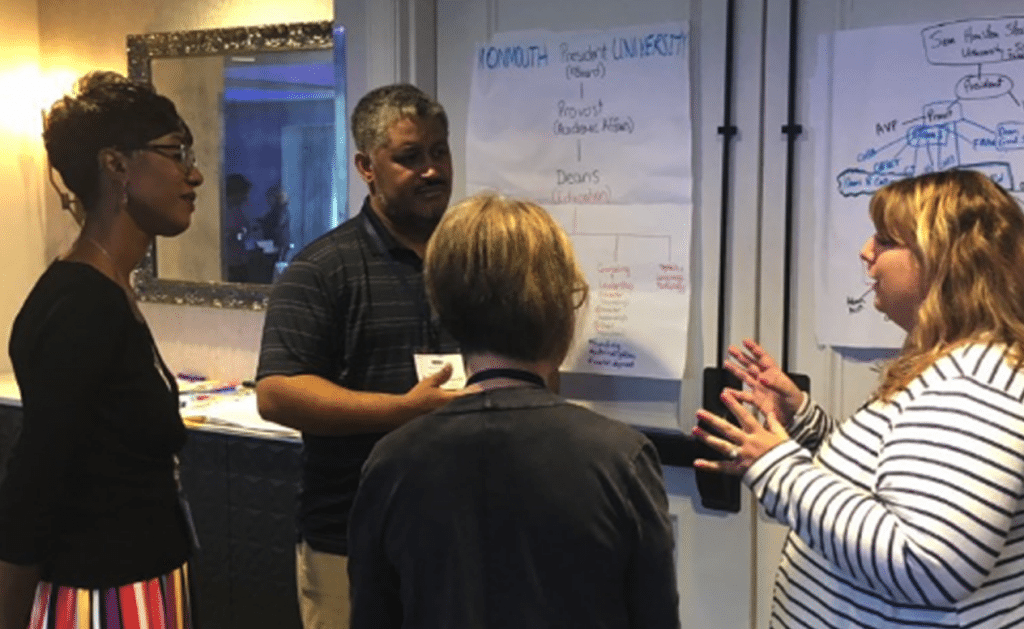
More than 90 leaders from education programs across the country convened in Pittsburgh, PA. for AACTE’s 2019 Leadership Academy, June 23-27. Attendees shared their experiences on Twitter using #AACTELA19 and offered testimonials about their experience. Here’s what a few participants had to say:
“The AACTE Leadership Academy was a fantastic opportunity! The combination of the excellent instructors, event organization, and content contributed to an extremely worthwhile experience. While I expected to learn more about leadership, I did not anticipate how important the other participants were going to be to the Academy. My network has significantly expanded as a result of the Leadership Academy, and my new colleagues (and friends) are a wealth of informa
11 Jul2019
By Jerrica Thurman
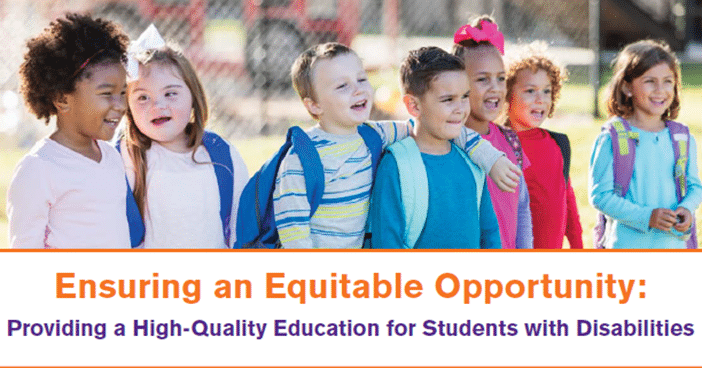
The Council of Chief State School Officers (CCSSO) recently released Ensuring an Equitable Opportunity: Providing a High-Quality Education for Students with Disabilities, a report that details policy and practice considerations around individualized education plans chiefs and state education leaders can reflect upon and implement in ensuring all students, especially students with disabilities, have access to a high-quality education. Students with disabilities are provided with an individualized education program (IEP) to ensure they receive specially-designed instruction and related services. The IEP is the primary mechanism for ensuring students with disabilities receive the right educational content and rigor at the right moment in their education.
The Education for All Handicapped Children Act of 1975 marked an historic win for civil rights when the doors to public education were opened for all students. For the first time, children with disabilities had access to a public education and the hope of a productive and fulfilling future. Today, the Individuals with Disabilities Education Act of 2004 (IDEA), the most recent iteration of that law, aims to deliver on that promise; namely, that all students with disabilities have equitable access to a free appropriate public education (FAPE) in the least restrictive environment.
11 Jul2019
By Roger Riddell and Naaz Modan
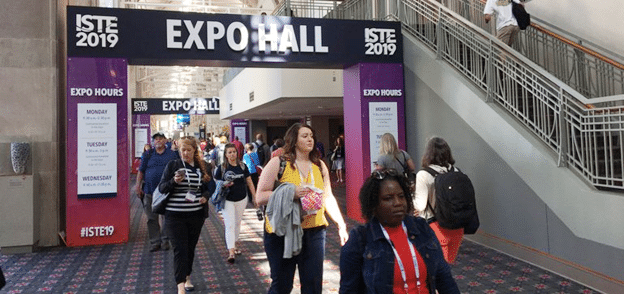
Credit: Roger Riddell/Education Dive
The following is an excerpt from an article originally published in Education Dive and is reprinted with permission. The article summarizes the 2019 annual International Society for Technology in Education (ISTE) conference in June.
Prepping new student teachers for digital learning
In a Monday morning session, ISTE Standards Senior Director Carolyn Sykora, ISTE Higher Education Recognition Program Lead Reviewer Sarah McPherson and the Fairfield University Graduate School of Education and Allied Professions’ Joshua Elliott detailed how ISTE is working with teacher preparation programs to recognize their quality and provide a simpler path to the ISTE Certification for Educators.
According to data from the U.S. Department of Education cited by Sykora, 146,000 graduate degrees in education were awarded in 2016, and there were 451,000 pre-service educators in 2014. The department also made a higher ed policy addendum to its National Education Technology Plan, to which Sykora noted there’s a lot of alignment between recommendations and the ISTE Standards for Educators and Students.
That’s noteworthy, given that a number of states—including Wisconsin, Michigan, Connecticut, Vermont, Texas, Washington, Delaware, Iowa, Utah, New York, Wyoming and Arkansas—and individual districts are adopting the standards.
09 Jul2019
By Michelle Buehl and Jane Vogler
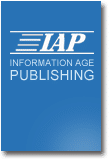 As co-editors, we are seeking chapter authors for a book we are publishing with IAP: Information Age Publishing titled Teaching Learning for Effective Instruction. The volume is part of the series, Theory to Practice: Educational Psychology for Teachers and Teaching, and it is scheduled to be released in early spring 2021.
As co-editors, we are seeking chapter authors for a book we are publishing with IAP: Information Age Publishing titled Teaching Learning for Effective Instruction. The volume is part of the series, Theory to Practice: Educational Psychology for Teachers and Teaching, and it is scheduled to be released in early spring 2021.
Education researchers and practitioners are invited to submit chapter proposals between 500-750 words by September 15, 2019. Chapters in this volume may include
- a review of the empirical research that supports the teaching of learning and cognition as it applies to P-12 settings;
- a description of instructional practices used in college courses that have been effective in teaching about and modeling principles of learning and cognition; or
- a systematic discussion of issues surrounding the teaching of learning and cognition theories, research, and classroom applications, with clear connections between the empirical literature and the instructional practices.
27 Jun2019
By North Carolina State College of Education

The NC State College of Education and The Innovation Project have selected 19 N.C. High School Mathematics Master Teaching Fellows.
Supported by a five-year, $1.8 million grant from the National Science Foundation, this program will prepare, support and retain master teachers of mathematics from high-needs school districts across the state of North Carolina, and is a partnership between the NC State College of Education, The Innovation Project and seven school districts where the 19 fellows come from:
25 Jun2019
By The Virgin Islands Consortium
This article and photo originally appeared in The Virgin Islands Consortium and is reprinted with permission.
The University of the Virgin Islands on Monday launched an Inclusive Childcare Laboratory and Diagnostic Center on the St. Thomas Campus. According a release the institution of higher learning issued, the new facility is intended to enhance the educational experience of preservice teachers who will be supervised by professors as part of their studies—while supporting the university’s students and employees to better manage the challenges of balancing parenthood and college life. UVI will be among the first Historically Black Colleges and Universities to provide this service.
The establishment of a research-based childcare program linked to early childhood and the School of Education has been a goal of UVI President David Hall’s since 2014. “This idea has evolved over the years and it’s no longer just a place to care for our students’ children, but an opportunity to create a model early education center that can help enhance the quality of early childhood education throughout the Virgin Islands,” Mr. Hall said. “The significance of this project is now more transformative than our students imagined.”
As many as 30 children can be admitted at the center at a time. The center is open for children between ages two to eleven. Initially, the center will be operational from 3 p.m. to 10 p.m. However, it is expected to evolve from an after school to full-day childcare center, according to the university.
The idea for the childcare center arose from a survey of UVI students, staff and faculty who emphasized the need for such a facility on campus. “The University’s ability to address this critical need indicates that we listen to our students and we strive to address their needs,” Mr. Hall said.
21 Jun2019
By Action News Jax
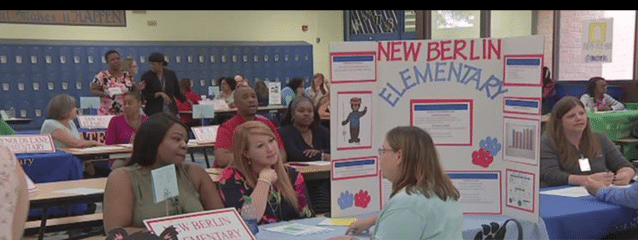
This article and photo originally appeared on Action News Jax and are reprinted with permission.
The Duval County School District is working hard to recruit between 200-250 teachers before the start of this school year.
That number is down since Action News Jax first told you last week the school district needed to fill more than 400 holes.
Action News Jax reporter Courtney Cole shows us a program that’s helping to recruit, admit and support local scholars going into education.
“This is a really big opportunity for us, knowing that we have a really big role to fill,” said Jarred Jackson.
Jackson is just one of the nine teens starting his journey to fill the really big role of an educator.
“Just knowing that we can and that we’re able to—is very exciting for us,” Jackson told Action News Jax Courtney Cole.
Right now teachers are in high demand across the state—and in Duval County.
17 Jun2019
By Jane E. West
This blog post is written by AACTE consultant Jane West and is intended to provide update information. The views expressed in this post do not necessarily reflect the views of AACTE.
I started last week in NYC visiting a fabulous early childhood program called Beekman House in the south Bronx. They have a partnership with Bank Street College. I was once again rendered speechless (hard to do) by the incredible teaching I saw. It made me want a do-over for pre-k! This is part of EdPrepLab— a new initiative by Learning Policy Institute. Check out the Ed Prep Matters blog article to learn more. Shout out to AACTE for giving me this opportunity!
- House Completes Portion of Massive Spending Bill … To Be Continued Next Week
Members of the House hightailed it out of town Thursday leaving a portion of the $982 billion spending bill completed—but more to come next week. The portion of the bill completed is the Labor/HHS/Education part of which includes $75.9 billion for the Department of Education. The House was in session all night Wednesday, finally adjourning at 4:00 a.m. on Thursday only to return again later Thursday morning.
Rep. Rosa DeLauro (D-CT) wins the prize for no sleep, as she was there shepherding her bill through every minute of the process and the over 100 amendments offered. She reported getting only an hour of sleep noting “You know, you’re so wired!”
12 Jun2019
By NCLD
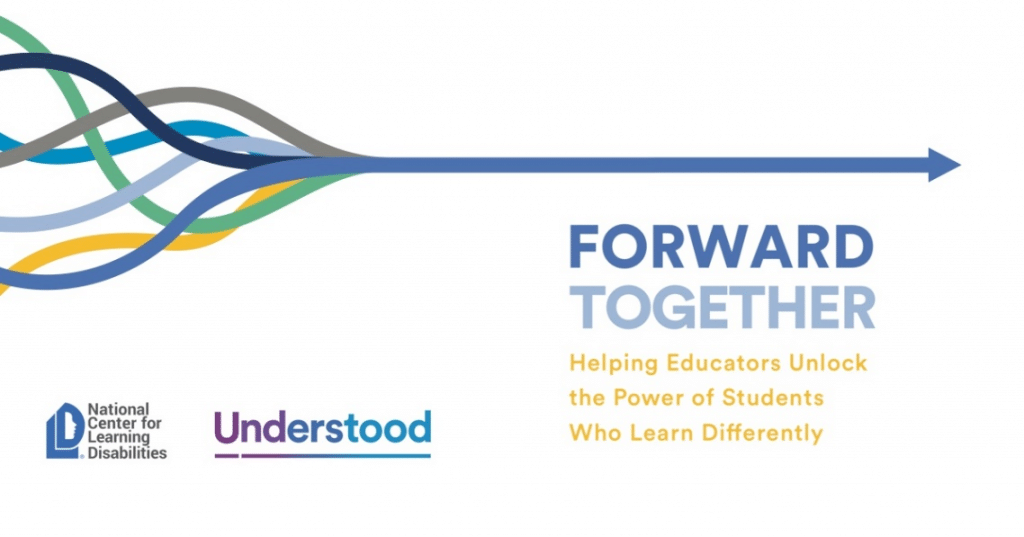
One in 5 students in the United States have learning and attention issues. This includes those with identified specific learning disabilities, diagnosed attention deficit and hyperactivity disorder, or related disorders that impact learning. Despite often having above average or average intelligence, the majority of these students are achieving below grade level. This equates to millions of students across the nation whose strengths and potential are going untapped.
The National Center for Learning Disabilities (NCLD) and Understood set out to unpack and address this problem. We partnered with teachers—often the most consistent touchpoint for students after their caregivers—to understand their experiences and insights. We rooted these experiences in rigorous research focused on general education classrooms, where the majority of the “1 in 5” spend most of their time. The culmination of this work is found in “Forward Together,” a new report from Understood and the NCLD.
AACTE is joining several other education organizations to develop Forward Together Toolkits for our teachers and teacher educators. Stay tuned for more information on the dissemination of those toolkits!
12 Jun2019
By Gretchen Wright
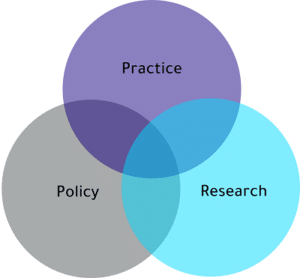 Research shows that teachers are the number one in-school factor affecting student outcomes and principals are the number two factor. One important metric for those outcomes is how well and how equitably our nation’s diverse students are able to navigate our increasingly global and technologically complex world, where skills like critical thinking, collaboration, communication, and being able to apply knowledge in a range of contexts are crucial to success. Today, Learning Policy Institute and Bank Street Graduate School of Education have announced the launch of the Educator Preparation Laboratory (EdPrepLab), a new initiative to help educator preparation programs ensure that new teachers and leaders are able to provide all k-12 students with the kind of deeper learning that helps them develop those skills.
Research shows that teachers are the number one in-school factor affecting student outcomes and principals are the number two factor. One important metric for those outcomes is how well and how equitably our nation’s diverse students are able to navigate our increasingly global and technologically complex world, where skills like critical thinking, collaboration, communication, and being able to apply knowledge in a range of contexts are crucial to success. Today, Learning Policy Institute and Bank Street Graduate School of Education have announced the launch of the Educator Preparation Laboratory (EdPrepLab), a new initiative to help educator preparation programs ensure that new teachers and leaders are able to provide all k-12 students with the kind of deeper learning that helps them develop those skills.
EdPrepLab brings together 15 of the nation’s leading teacher and principal preparation programs to collaborate on further developing and documenting models for preparation that equip educators to advance deeper learning and equity, and that can inform other programs across the nation. The initiative will also support research to improve preparation programs and work with policymakers at federal, state, and local levels to help leverage policies that encourage the use of research-based practices that ensure new teachers and school leaders are well-equipped to provide deeper learning and to build the next generation of equitable schools and instructional education practices.
“Our world has changed significantly since the U.S. education system was first developed, and students today need an education that supports and prepares them for that more diverse, technology-driven, knowledge-based society,” said Learning Policy Institute President Linda Darling-Hammond. “That means we need to prepare teachers and school leaders to provide this kind of education. Fortunately, we have research to guide the way. There is a wealth of new knowledge about the science of learning and development, how social and emotional skills support academic learning, and how to ensure that students really understand what they have learned.”


















 Research shows that teachers are the number one in-school factor affecting student outcomes and principals are the number two factor. One important metric for those outcomes is how well and how equitably our nation’s diverse students are able to navigate our increasingly global and technologically complex world, where skills like critical thinking, collaboration, communication, and being able to apply knowledge in a range of contexts are crucial to success. Today, Learning Policy Institute and Bank Street Graduate School of Education have announced the launch of the
Research shows that teachers are the number one in-school factor affecting student outcomes and principals are the number two factor. One important metric for those outcomes is how well and how equitably our nation’s diverse students are able to navigate our increasingly global and technologically complex world, where skills like critical thinking, collaboration, communication, and being able to apply knowledge in a range of contexts are crucial to success. Today, Learning Policy Institute and Bank Street Graduate School of Education have announced the launch of the